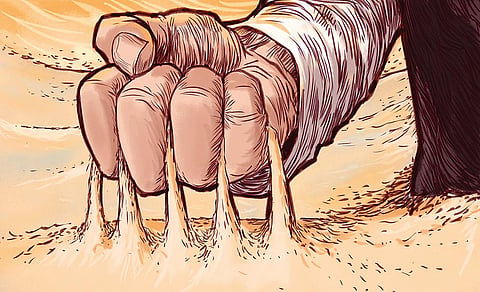

The brutal police custodial murder of a father and his son in Thoothukudi district of Tamil Nadu shook the conscience of the nation last week.
It is good to know that we have some conscience left to be shaken. The crime of Mr Jayaraj and Benix was that they had kept their mobile shop open for a few minutes more than the designated time of closure. Some say, even that is not true.
It does not matter now. What matters is that they have been brutally murdered for trying to eke out a living in these cruel times.
This, in a country, where terror accused become MPs, where more than half the elected representatives have criminal cases pending against them and where multibillionaire businessmen loot the country with gay abandon and flee our shores, where quacks and frauds flourish in the name of religion.
A few days ago, many middle-class Indians were gleefully sharing the videos of police beating up impoverished men and women.
The police were punishing them for walking on the street. They were not marching against something or protesting anyone. They were just going home.
They were bolting from the cruel and indifferent cities which were locked down at a notice of four hours. They were walking in empty stomachs because there were neither special flights nor trains nor buses to take them home, until towards the fag end of the lockdown.
The privileged were working from home, holed up with sufficient provision for months and binge-watching television shows.
Since these privileged had to be saved from the dreaded epidemic and the poor who were walking on the streets were assumed to spread Covid, such discipline is necessary, was the argument in favour of this savagery.
We saw the police lashing out with lathis on the backs of these people, making them frog-jump or do multiple squats etc to teach them about the need of social distancing and staying at home.
They were just going home, fleeing from poverty, indifference of the society and lastly from an epidemic brought home by the globe trotters.
A George Floyd incident brought half of USA to the street. If we start marching for every police brutality that occurs in India, we would have been doing nothing else but marching endlessly for the last 70 years.
Police brutality is not new to India. Right from colonial times, ordinary Indians have always been at the receiving end of police lathis. Freedom fighters had faced the batons many times, but there was some poetry in it.
They were fighting against the colonial rule. What changed after Independence was the victims of these cruelties.
The advantaged know how to tackle the police through bribes or pulling a few strings here and there.
The poor, the underprivileged, the Dalits, the minorities are more likely to be the victims of the colonial hangover of our police force.
It would be unfair to brush the entire police force as oppressors, but the way Indians see the police and the way the police see themselves must change.
We celebrate movies that show rebellious police officers fighting corrupt politicians, mafia, criminals etc heroically.
While this may be entertaining, what is often missed is the way these heroes are deified not for upholding the law but for taking the law into their hands, often in a violent way.
It is no wonder that a society that is fed on such ideas would cheer when the police act as judge, jury and executioner, and render street justice. The duty of the police is not to deliver justice but enforce law and order.
The Hyderabad case where the police shot dead suspected rapists of a lady doctor and the support the act received from the public show how much we cherish such law of the jungle.
If the law enforcers refuse to play by the law and rule book, what we have is not law enforcers but state-sponsored criminals.
The Supreme Court had directed states to establish police complaint authorities at state and district levels in 2006 itself. Precious little has been done by most states in this regard.
Niti Aayog had pointed out in 2016 that most states had not complied with the apex court order.
In 2018, the National Human Rights Commission called the Uttar Pradesh Police, “an organised gang of criminals.”
There have been eight reports of National Police Commission, which have been conveniently ignored by most states.
In many states, the police act as the henchmen of the party in power. Hundreds of years of rampant casteism and feudalism have a deeper influence in our psyche than the imported idea of Democracy, which is yet to achieve maturity in our land.
The government institutions, ministers, members of parliament and assemblies, the police and the army are to serve the people of this country and not vice versa.
If we remember it and remind those who forget it often, perhaps we would have made a step away from feudalism and towards proper democracy.
Anand Neelakantan
Author of Asura, Ajaya series, Vanara and Bahubali trilogy
mail@asura.co.in